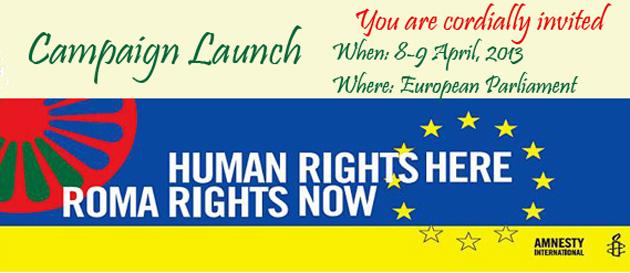Amnesty International calls for an end to discrimination against Romani people in Europe

On the occasion of International Romani Day on 8 April, Amnesty
International (AI) is warning the European Union that it is not doing enough to
end discrimination against Romani people in the Member States. The world’s
largest human rights organization has launched a Europe-wide campaign called “Human
Rights Here, Roma Rights Now” (see www.amnesty.org/Roma).
“The EU must implement immediately
the considerable measures at its disposal to sanction governments that are
failing to tackle discrimination and violence against Roma,” said John Dalhuisen, Europe and Central Asia Programme Director. “Such
practices run counter to EU law and the principles
of liberty, democracy and respect for human rights it was founded on.”
The estimated six million Roma
living in EU countries fall far below the national average on almost all human
development indicators. Eight out of ten Roma are at risk of poverty, while only
one out of seven young Roma adults have completed upper-secondary education.
Forced evictions of Roma continue
to be the norm rather than the exception in a range of European countries such
as France, Italy, and Romania.
Education is segregated in the Czech Republic, Greece and Slovakia. This is at
odds with national and EU laws prohibiting racial discrimination.
More than 120 serious violent
attacks against Roma and their property occurred in Bulgaria, Czech Republic,
Hungary and Slovakia and Bulgaria between January 2008 and July 2012, including arson attacks, shootings, and
stabbings. State authorities, including the police, have in
many instances failed to prevent or thoroughly investigate these attacks.
In 2000, the EU adopted the Race
Equality Directive that prohibits discrimination based on race or ethnicity in
the workplace, education, access to goods and services, housing and health
care. The EU’s Charter of Fundamental Rights, which entered in force in 2009, also
prohibits discrimination and enshrines the rights to education, social and
housing assistance and work.
As the EU’s executive body, the
European Commission is empowered to act against EU Member States when they fail
to comply with EU law and the Charter. However, so far this has never happened
with regard to policies and practices discriminating against the Roma or any
other ethnic minority.
“The European Commission has the
powers to make a lasting impact on the lives of marginalized and discriminated
communities in Europe, including the Roma. Regrettably, it has so far been
hesitant to act against states which have violated the human rights of Roma,”
said Dalhuisen. “What we see is the Commission
sanctioning countries on technical issues in areas of transport and taxation,
for example, but failing to grapple with issues which are of vital importance
to millions of people such as forced evictions, segregation and hate-motivated
attacks. The
Nobel Peace Prize-winning EU has the power to end discriminatory practices that
are rife in many of its Member States. It must use these now.”
Amnesty International’s briefing, Human
rights here. Roma rights now. A wake-up call for the European Union is a call
to the EU to take decisive action and play a central role in ending the
discrimination against Roma in Europe. The core of this briefing is an EU-wide petition
to the EU Commissioner for Justice, Fundamental Rights and Citizenship, Viviane
Reding which aims to clearly articulate the demand that discriminatory practices
against Romani minorities in Europe be eliminated (see www.amnesty.org/RomaRightsNow).
In the Czech Republic, the campaign is supposed to draw
attention to the fact that Czech authorities and institutions use discriminatory
mechanisms very similar to those that complicate the lives of Romani minority
members in other countries (Hungary, Italy, Romania, Slovakia, etc.) “The
campaign should help prompt discussion of the situation of the Romani minority in
the Czech Republic and move it from prejudicial debates to a higher level,
raising awareness of the fact that various states in Europe use similar discriminatory
mechanisms,” said Mark Martin, director of the Czech section of Amnesty
International.
During the campaign, AI will also be turning to Members of the European Parliament, who
have the opportunity to put political pressure on both the European
Commission and the Member States. On 8 April, activists with Amnesty
International will install a mock-up of a Romani settlement and an exhibition of
photographs drawing attention to the kinds of discrimination Romani people face
in Europe in the public space in front of the European Parliament in Brussels.
Between 10 and 12 million Romani people
live in Europe, about half of them in countries that are EU Member States. Three-quarters
of European citizens admit Romani people are a high-risk group jeopardized by
discrimination. Most European citizens (53 %) also believe that all of society
would profit from better integration of Romani people.
Disturbing facts about the EU and
Romani people
- Discrimination, forced evictions,
segregation and violence are all perpetrated against Romani people in the
European Union.
- Eight out of 10 Romani households in
the EU live on the edge of poverty.
- In 2012, a survey confirmed that 34 %
of European citizens believe the inhabitants of their country would feel “unpleasant”
(and 28 % “somewhat unpleasant”) should their children have Romani schoolmates.
- In Bulgaria, the Czech Republic, Hungary
and Slovakia, more than 120 serious violent assaults against Romani people and
their property were reported between January 2008 and July 2012, including
shootings, stabbings, and the throwing of Molotov cocktails.
The Czech Republic
An estimated 200 000 Romani people comprise 1.9 % of
the population of this country. About one-third of them (60 000 – 80 000)
live in roughly 330 distinct Romani settlements, where unemployment is more
than 90 %.
Romani children represent 32 % of the pupils attending
schools for children with light mental disability, where they are instructed
according to a reduced curriculum.
At least five Romani people were killed in the Czech
Republic and 22 injured, including three teenagers, during violent assaults
between January 2008 and July 2012.